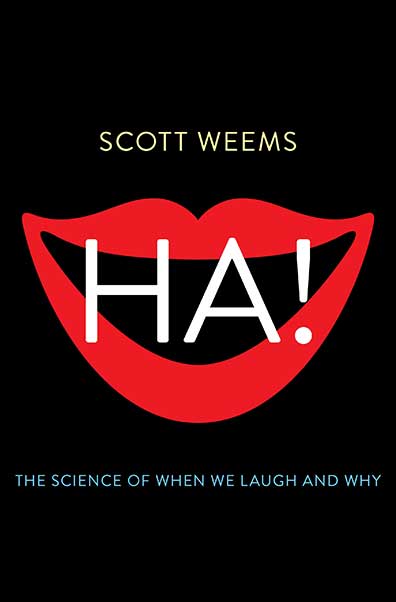
So a guy walks into a bar and…
Okay, you say you’ve heard that one. Well, then, how ‘bout this: There once was a man from Nantucket who… Wait, how does an elephant hide in the refrigerator?
Either you’re laughing now, or you’re not – so why are some things funny, while others are just ridiculous? Why is it that what was hilarious to Grandpa barely raises a “huh” from you? Read the new book “Ha!” by Scott Weems and find out.
Chimps do it. Dogs, birds, and rats do it. And you laugh, too, up to twenty times a day. To understand why, Weems says you need to recognize “the massive complexity of the human brain” and its reliance on conflict.
The matter inside your noggin, as it turns out, deals with confusion and mess all the time. There’s a constant “battle” between feelings and thoughts, and when we hear or see something funny, it adds a bit of surprise and discomfort.

It surely helps that when we laugh, our brains are flooded with dopamine. We feel good, and we want to share it with those around us. There’s a reason for TV laugh-tracks, in other words.
Some researchers have proven that the best jokes are 103 words long. Others have said that there are more than 40 “kinds” of humor, including “sick humor” (Weems calls that a “means of addressing our feelings”), humor that helps people cope (what doctors use in the ER), irony, and satire. Yes, our senses of humor change as we age (“elephant jokes” probably aren’t as funny to you as they were when you were a first-grader) and women laugh more than men. You can even predict personality and political preference by what someone finds funny.
But despite the fact that Bible scholars still debate over whether Jesus ever laughed and historical leaders tried to outlaw it, humor is good for us. Laughing burns calories, it’s good for the heart, it suppresses glucose, improves allergies, and lessens arthritis pain. It can “protect” us from stress, improves our quality of life, and “simply understanding jokes makes us funnier people.”
And that’s a curious statement when you consider that “Ha!” isn’t really all that funny. No, it’s more of a science-y book that lives up to its subtitle (“The Science of When We Laugh and Why”) – making it serious, but still entertaining.
That’s because author Scott Weems melds brain science with corny jokes and factoids to delight readers who’ve ever wondered why one thing tickles their funny bones, but not the other. There are times, admittedly, when the science part got too heavy-duty for me, but the info on why humor works (or doesn’t) is good, and I loved the subtle lessons on how to make more laughter.
Don’t expect this book to crack you up. You’ll find other things to do that, and this will explain why. For anyone who’s ever ROFL, “Ha!” just raises the bar.
* * *
And NOW for something TOTALLY different, you’ll also want to find “The Humor Code” by Peter McGraw and Joel Warner. This book takes a look at humor in a different way, by following a scientist and a writer around the world to find what’s funny. You’ll laugh, you’ll cry, you’ll laugh some more. Jokes included.
The Bookworm is Terri Schlichenmeyer. Terri has been reading since she was 3 years old and she never goes anywhere without a book. She lives on a hill in Wisconsin with two dogs and 12,000 books.
